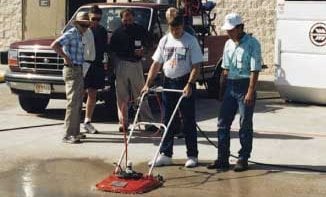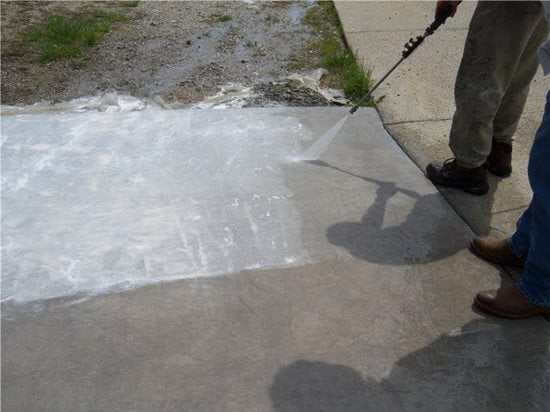- Concrete Cleaning Home
- Choosing a Concrete Cleaner or Degreaser
- How to Clean Exterior Concrete
- Concrete Cleaning Chemicals
- Pressure Washing Concrete
- Cleaning and Sealing Exterior Concrete: A Guide to Maintaining and Caring for Exterior Decorative Concrete of all Types
- Tips for Maintaining Exterior Concrete
- How to Clean Concrete
- How to Clean Concrete Floors
- How to Clean a Concrete Patio
- Cleaning a Concrete Driveway
- Cleaning Stamped Concrete
- Pool Deck Cleaning
- How to Clean Concrete Countertops
- How to Remove Stubborn Stains and Discoloration
- Advice on Cleaning Concrete Countertops, from Concrete-Countertops.org
- Related Information:
- Concrete Sealers
How to Pressure Wash Concrete Patios, Driveways & More
Tips for power washing concrete driveways, sidewalks and patios, plus how to pick the best concrete pressure washerA concrete pressure washer is one of the best machines for cleaning concrete. It comes in handy for cleaning driveways, sidewalks and patios that are very dirty or have stubborn stains. You can rent or purchase a power washer and clean the concrete yourself, or higher a contractor who offers pressure washing services and has commercial grade equipment.
Find concrete cleaning contractors near me.
TIPS FOR PRESSURE WASHING CONCRETE
If you're going to power wash your concrete yourself, make sure you know what you're getting into before you begin.
Here are some important tips:
- Plan for at least 2-4 hours for this project
- Dress in long pants and sturdy shoes
- Some people also wear gloves and safety glasses
- Apply a degreaser or concrete cleaner before power washing
- Start at the highest point and work your way down
- Keep the nozzle about 12" from the surface, getting too close could cause damage
- Use a steady, sweeping motion as you move back and forth across the concrete
- Consider sealing the concrete after it has completely dried
Keep in mind that every concrete surface is different. Older concrete or concrete that has been stamped or stained may respond differently to the powerful stream of water. Test and check your results in a less visible spot before proceeding to clean the entire surface.
WHAT TYPE OF PRESSURE WASHER IS BEST FOR CLEANING CONCRETE?
There are many different pressure washer options to consider, including:
- Small, light-duty units you attach to a garden hose
- Big, commercial-grade machines
- Various levels of pressure (PSI)
- Gas and electric models
- Wheel-mounted, walk-behind surface cleaners
What PSI pressure washer do I need to clean concrete?
To clean concrete effectively, use a power washer with a pressure rating of at least 3000 psi and a flow rate of at least 4 gallons per minute (gpm). Although higher pressures may be required to remove tough contaminants such as paint and heavy tire-skid marks, most power-washing contractors agree that 3000 psi will do the trick for almost all cleaning jobs.
Flow rate and nozzle type
Once an adequate water pressure is established, flow rate determines the cleaning speed, especially how fast contaminants are flushed from the surface. Heavily soiled concrete, requires higher flow rates. Several contractors recommend a power washer with a volume output of 5 or 6 gpm. When cleaning vertical surfaces, higher flow rates are not as critical because gravity helps contaminants flow from the surface.
Cleaning speed also can be increased by using a rotary nozzle instead of a standard fan nozzle. To produce a fan pattern, standard nozzles deflect the water on an angle, which slows the water down. Rotary nozzles spin an undeflected water jet in a circular path, so the water leaves the nozzle with greater speed.
 All-Purpose Concrete Cleaner
Removes sealers and coatings.
All-Purpose Concrete Cleaner
Removes sealers and coatings.
 Cleaner & Degreaser
Starting at $11.95
Cleaner & Degreaser
Starting at $11.95
 Brickform Neutra Clean
A pH neutral cleaner that combines cleaning and light degreasing
Brickform Neutra Clean
A pH neutral cleaner that combines cleaning and light degreasing
 Commercial Surface Cleaners
Cuts through grease and grime. Environmentally friendly
Commercial Surface Cleaners
Cuts through grease and grime. Environmentally friendly

Wheel-mounted power-washing units increase cleaning speed on large horizontal surfaces. Delco Cleaning Systems
Wheel-mounted cleaners vs. standard power-washing wands
To improve cleaning speed on large flatwork areas, try a wheel-mounted power washer that resembles a lawn mower. Within the metal housing are nozzles mounted on spinning bars. Using a standard power-washing wand takes more time and is tiring. Using a walk-behind washer is more productive and easier on your body.
Hot vs. cold water machines
Cold-water power washers are cheaper, lighter, and simpler to use than hot-water units, which require a heavy heating coil and burner system to heat the water. Whereas a cold-water unit may cost $2,000 and weigh 200 pounds, a comparable hot-water unit often will cost more than $3,000 and weigh more than 400 pounds.
However, hot water cleans faster than cold water, and this rule holds true for power washing. Although cold-water units are suitable for removing dirt and often suffice for smaller, residential applications, most commercial power-washing contractors believe that using hot water is worth the added expense. The benefits of hot water are especially clear when cleaning oil and grease.
CLEANING CONCRETE DISPOSAL REQUIREMENTS
Depending on the power-washing chemicals used and the contaminants removed from the concrete, water runoff may be prohibited from entering storm sewers. Municipal codes vary greatly depending on the location. Some regulations, for example, require all discharge to be hauled to a waste-disposal site. Check with the local Environmental Protection Agency office for information on disposal requirements.
AVOIDING EQUIPMENT BREAKDOWNS WHEN CLEANING
All power washers require routine maintenance because the high-pressure water wears out seals, O-rings, springs, and other components. But you can avoid excessive maintenance costs by following these operating tips:
-
Never run the pressure washer without water. This will cause premature failure of the pump seals.
-
Don't run the power washer in bypass for more than a few minutes (the unit is running but the trigger is not depressed). The water circulates in a closed loop and heats up quickly. Most pumps have a thermal-relief valve, but if the valve fails, the pump can be damaged.
-
Make sure the water source provides the volume of water needed by the pump. If it doesn't, the pump will suck in air, which can damage the pump. The first sign of air in the pump is a loss of pressure and a hammering noise.





